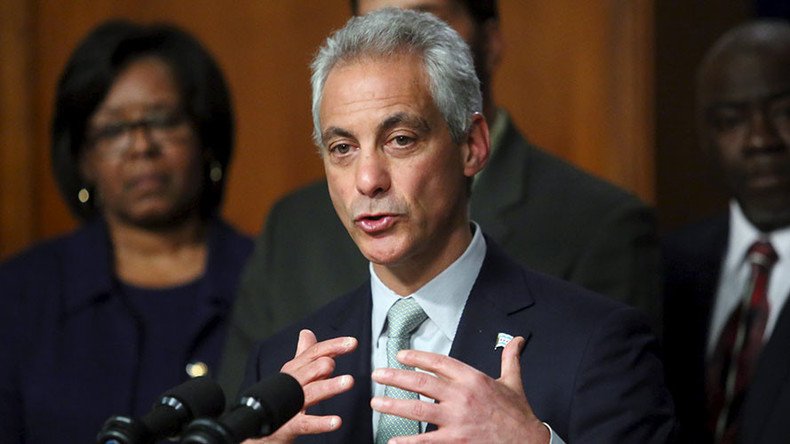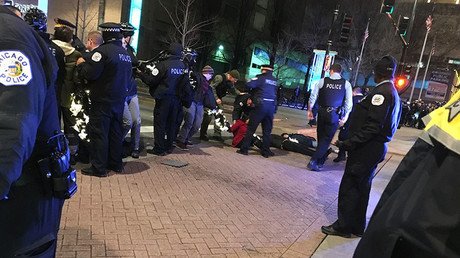Chicago announces 'fundamental' changes to police practices

Chicago, Illinois police will undergo changes in officer training, affecting interaction with suspects and the use of all types of weapons ‒ from pepper spay to guns. The change comes in the aftermath of mass protests sparked by a series of police killings.
“All of us will accept nothing less than complete and total reform of both the system and policing culture here in the city of Chicago,” Chicago Mayor Rahm Emanuel said at a press conference announcing the new procedures Wednesday afternoon. “Just because you train that you can use force doesn’t mean you should, and helping officers have that distinction ‒ and the training that goes with it ‒ is essential.”
The embattled mayor also applauded the police department for “owning, embracing and publishing one of the most meaningful policy changes in their history.”
The Chicago PD has been under fire for months due to a series of officer-involved shootings that killed several people. The public deemed the incidents as part of a larger pattern of excessive use of force by Chicago police, sparking numerous protests.
Chicago cop kills student & 55yo woman in response to domestic disturbance https://t.co/MtAxp8JlHopic.twitter.com/U9EnaiQQiE
— RT (@RT_com) December 28, 2015Interim Superintendent John Escalante called the changes "fundamental," noting that the Chicago PD looked at the best practices of 15 other major police departments around the country, including in New York City; Portland, Oregon; Seattle, Washington; and Cincinnati and Cleveland, Ohio. The Cleveland Police Department has also been heavily criticized for the shooting death of 12-year-old Tamir Rice last November.
“Our goal is to change the way officers think when they approach a critical incident by establishing time and distance to allow for more prudent thinking and physical space to promote a safer environment,” Escalante said. “Communication, verbal skills, talking more to individuals involved so that a relationship can be established in a less aggressive or confrontational manner” are crucial.
Officers involved in shootings will be put on desk duty for 30 days, instead of the current three days, while the incidents and their actions are investigated, Emanuel said. The police department will also review the crisis response policies that are in place now to see if they need to be amended in any way.
“Today we are taking additional steps to create more time and distance in these situations and other encounters to make environments safe and safer for all. We will improve communication between officers and individuals to make these encounters less confrontational and more conversational,” Emanuel said.
The Chicago PD will double the number of Tasers deployed to 1,400, as well as training the officers to use them properly, Emanuel said, thanking the city’s black and Hispanic leaders for their push for more Tasers.
“With the right policies, the right procedures and the right practices, we can change our officers’ perspectives to help them ensure their own safety and the safety of others. We want to make sure that our officers are not just operating in either first gear or fifth gear, but to recognize the degrees in between so they can respond appropriately to each individual situation, where force can be the last option, not the first choice,” the mayor said.
The department will also emphasize calling for backup “whose training, appearance and tactics can complement communication efforts in a critical encounter and help defuse tension points to gain better control,” Escalante said. “We expect that every police officer develops and displays skills and abilities that allow them to help dissolve confrontations by using the least amount of physical, of lethal force necessary.”
The majority of the new training will cover mitigation or de-escalation techniques, and will be emphasized “at all levels of our use-of-force module,” he added.
There is a use-of-force module for every type of interaction officers have from the time they arrive at a scene, and the new policies will be emphasized in each module layer. Each level represents an escalation of the situation, starting with giving verbal direction, followed by officers having to put their hands on an individual, including handcuffing or physically restraining the person, Escalante said. The next layer involves the use of pepper spray, a baton or a Taser. The final use-of-force module covers the use of lethal force.
Emanuel promised to rebuild the trust between the police department and the city's residents.
“Willful misconduct and abuse cannot and will not be tolerated. When that happens, it undermines all the good police officers who are out there, and makes it harder for them to do their jobs effectively. Because, at the end of the day effective policing requires cooperation between the police and the members and the residents that make up the community. And that cooperation is impossible without trust.”
When asked if he considers the mentality of "shoot first, ask later" characteristic of Chicago police, the mayor refuted this notion.
“Changing the policing culture will not and cannot be done just overnight. These policies are not the end of the challenge, but they are the beginning of the solution," he said. "We can change the culture piece by piece, policy by policy to provide the safety that every resident deserves and to rebuild the trust where it has been lost. And that remains my ultimate goal.”
Chicago police torture ‘black site’ exposed at hearing https://t.co/rcrmqzl3Aapic.twitter.com/6BMdOIxXHW
— RT America (@RT_America) December 16, 2015The changes Emanuel announced Wednesday are just the latest in a series of attempts to change the police culture in the wake of several high-profile police brutality cases, most notably the death of Laquan McDonald, a black teen who was shot 16 times by a white officer, even after he lay motionless on the ground. The shooting occurred last October, but dash-cam footage of the incident wasn’t released until November of this year, sparking outrage when the video contradicted official statements. Officer Jason Van Dyke was charged with murder hours later.
So far, the changes have not been enough for protesters, many of whom are calling for both the mayor and Cook County State’s Attorney Anita Alvarez to step down.













